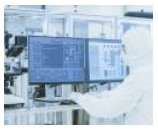
No one wants to take a tablet where the API (active pharmaceutical ingredient) is not absorbed. As these terms can be confusing, we will start with some definitions and testing apparatus. Then, we will cover how to scale tablet surface area, its relationship to tablet volume and differences in common tablet shapes. Next we will go over tablet solid fraction measurements and porosity. Lastly, we will mention effervescence ingredient ratios – how the ratio of citric acid with sodium bicarbonate affects disintegration and dissolution.
Disintegration is measured by USP<701> and measures the time it takes for a tablet to break down into smaller particles in a specified fluid, which simulates conditions in the gastrointestinal tract. Disintegration testing is relatively simple to measure with the proper equipment. Natoli Scientific has a Pharma Test PTZ Auto EZ fully automated tablet disintegration testing apparatus.
Dissolution is measured by USP<711> and measures the rate at which API is released as a solution from a tablet, providing information about the API’s bioavailability. Dissolution testing is more complex, requiring methods specified for detection of each particular API. Natoli Scientific has a HPCL (High performance liquid chromatography) apparatus to detect drug concentrations.
Tablet size and shape play an integral role in disintegration and dissolution results as we consider tablet surface area and volume. When scaling a tablet, surface area and volume change differently.
For example, if you want to double the weight of a tablet (while keeping the same compressed density), then tablet volume doubles and each tablet dimension (length, width, cup depth, etc.) are increased by a scale factor (SF) = (New weight / Old Weight) ^ (1/3). In this case, to double tablet weight the scale factor is the cube root of 2 or ~1.25992.
On the other hand, if you want to double the surface area of a tablet (keeping the same tablet proportions), then the scale factor is: SF = (New Surface Area / Old Surface Area) ^ (2/3). In this case, to double the tablet surface area the tablet needs to be increased by a scale factor of ~1.58740.
Tablet shape plays a critical role in the relationship between surface area and volume. In general, tablets that are more elongated provide more surface area than round tablets for faster disintegration and dissolution. Let’s take a look at three examples: each with a volume of 300mm^3.
• 10mm Round Convex (1.16mm cup depth, 0.1mm land, 5.00mm thickness) has a surface area of 249.88mm^2
• 7mm x 14mm Oval, Convex (End radius 2.30mm, 1.16mm cup depth, 0.15mm land, 5.11mm thickness) has a surface area of 257.68mm^2
• 6mm x 14.4mm Capsule, Convex (1.16mm cup depth, 0.15mm land, 4.76mm thickness) has a surface area of 263.19mm^2
The Technical Service at Natoli Engineering along with its Engineering department assists formulators in developing optimized tablet geometries to meet the needs of their application.
Aside from tablet shape, size, surface area and volume considerations, a critical role in tablet disintegration and dissolution is the tablet porosity, which is a function of their solid fraction. Solid fraction is the percentage ratio between the tablet’s compressed density and the true density of the formulation. True density is measured with a helium pycnometer. Higher solid fractions tend to produce harder tablets, which is measured with breaking force (kP). Tablet characterization to measure these values and more are available at Natoli Scientific.
Lastly, a special mention for effervescent tablet design. Effervescent formulations commonly need to optimize the ratio between their acids (i.e. citric acid) and their bases (i.e. sodium bicarbonate) to dissolve readily. Natoli Scientific has particular expertise on this “Magic Ratio”.
Exclusive
IPA’s 10th Global Pharmaceutical Quality Summit
Articles
Key Insights and Best Practices By Dr. Tarun Chugh
A Seasoned Perspective By Manan Dave
By Todd Martin, Natoli Engineering Company, Inc
Infocus
Presented by UhImann India, Optima, and Glat
Kevin Process Technologies
Tests and Process Optimization in Hyderabad





